We wish Chief Justice William Rehnquist well in his fight against thyroid cancer, and hope that he will be able to return to the bench soon. Even the New York Times seems to have caught the spirit, editorializing not long ago in support of Rehnquist's "proud record of defending the independence of the federal judiciary against intrusive attacks by politicians." Conservative politicians, that is.
The occasion was the Chief Justice's nineteenth—"and potentially final," the Times noted cheerily—annual report on the federal judiciary. In it, he showed "appropriate concern" over the bugaboo that frightens the Times even more than recent presidential elections: the "mounting criticism of judges for engaging in…'judicial activism.'" Those are his words, and his scare quotes.
While acknowledging that congressional criticism of judges and judicial decisions is "as old as our republic," Rehnquist drew the line at recent suggestions to impeach judges for decisions "regarded by some as out of the mainstream." In addition, he criticized several bills introduced in the last Congress that would limit the federal courts' appellate jurisdiction.
It is awkward but, alas, necessary to point out that the Chief Justice's arguments are hardly persuasive. For example, he announces that "Congress's authority to impeach and remove judges should not extend to decisions from the bench." That principle, he claims, was established two centuries ago by Congress's unsuccessful attempt to remove Justice Samuel Chase. Though impeached, he was not convicted. "From that day to this," Rehnquist declares, the political rule has been that "a judge's judicial acts may not serve as a basis for impeachment."
Now, the Chase precedent by itself creates no such rule, though as with the similar outcome in President Clinton's impeachment, it reinforces the presumption against bringing such actions unless the offenses are grave. Still, one has to ask: Are there no decisions by a federal judge, however contemptuous of the Constitution or the other branches, that might warrant impeachment?
Rehnquist apparently does not think so, though his argument depends on a political, not constitutional, rule, and one rather breezily asserted, at that. By contrast, when Alexander Hamilton in The Federalist asked what are the safeguards against judicial "encroachments on the legislative authority," he cited "the important constitutional check which the power of instituting impeachments…would give to [Congress] upon the members of the judicial department." In fact, wrote Hamilton, "This is alone a complete security. There can never be a danger that the judges, by a series of deliberate usurpations on the authority of the legislature, would hazard the united resentment" of the very body that could punish the judges' "presumption by degrading them from their stations."
Well, Hamilton may have been wrong about the last point, because judges have been usurping legislative authority for decades, and the Congress has let them. For most of that time, Congress was handily Democratic and happy to let the judiciary carry the ball. Had a truly indignant Congress flexed its constitutional muscles once or twice, judicial activism might have subsided long ago.
Of course, no one is suggesting that Congress subsist on a regular diet of impeachments. Rehnquist is correct that such a course would imperil judicial independence. But the courts are not supposed to be independent of the Constitution, and Congress should not be cowed into thinking that there is little or nothing it can do about that.
For example, there is its power to regulate and make exceptions to the Supreme Court's appellate jurisdiction. It's right there in Article III, section 2.
And the ordinary method of disciplining the courts is through the appointment process. This is the only method of which Rehnquist approves, at least in this report. He says nothing at all about constitutional amendments as a way to save the Constitution from the judges, despite the fact that several amendments, beginning with the 11th, have been adopted for that very reason.
In the end, Rehnquist seems uncomfortable with almost any constitutional rebuke of the judiciary, which is a shame for someone who used to be one of its most incisive critics. He is still a step or two away from Justice Sandra Day O'Connor's position, that any popular or legislative protest of the courts' mistakes is lèse majesté. Yet more and more, Rehnquist's love of precedent immures him in liberal precedents, and his love of democracy persuades him to tolerate offenses against the Constitution that have been blessed by a sleeping legislature.
We pray for his speedy recovery, and for the Constitution's, too.


